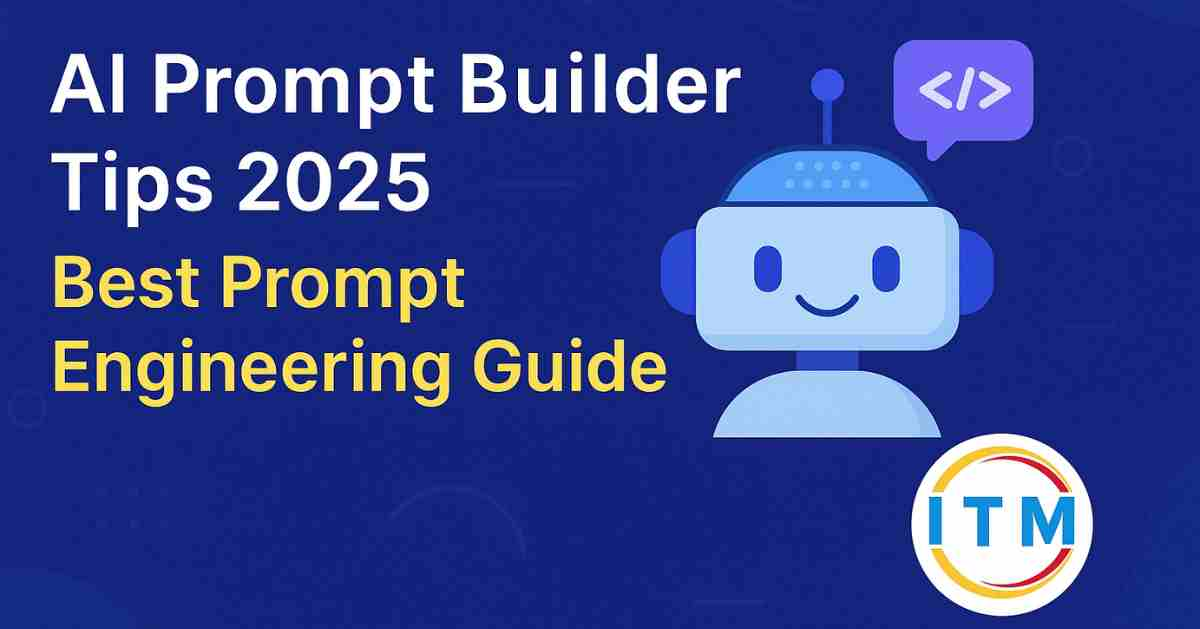AI Prompt Builder – What Is It
An AI prompt builder is a tool or technique for designing instructions that AI language models like ChatGPT, Gemini, Claude, or any other LLM can understand. It helps arrange inputs in a manner that will yield the most precise, relevant, and creative output from the AI.
Put in another way, “quality input leads to quality output”.
Why Prompt Engineering Is Essential in 2025
Since AI has advanced in areas like search, customer service, education, and content creation, prompt engineering best practices have become essential digital skills. With tools like ChatGPT-4o and Claude 3 Opus, the quality of the prompt determines:
- The tone of the response
- Accuracy of output
- Creativity or depth
- The format being used (bullet points, markdown, etc.)
Effective AI prompts tips are now part of training programs for marketers, developers, and educators across the globe.
How to Write the Perfect AI Prompt: Step-by-Step
Step 1: Be Specific About What You Want
Avoid vague inputs. Instead of “Tell me about marketing,” ask:
“Give me 5 digital marketing trends for startups in 2025, with examples.”
Step 2: Set the Role or Perspective
Role prompting techniques improve response quality. Example:
“Act as a UX designer and explain how to improve a mobile app’s onboarding process.”
Step 3: Define the Output Format
Let the model know if you need a list, table, email, code, etc.
Example: “Write a bulleted list of pros and cons of using AI in customer service.”
Step 4: Add Context
Mention your audience or use case.
Example: “Write a LinkedIn post for product managers introducing a new AI feature in our app.”
Step 5: Test and Refine
Prompts are iterative. Run multiple versions, compare, and refine based on clarity and usefulness.
Quick Prompt Formulas That Work
Here are some prompt styles that consistently yield quality results. These follow prompt engineering best practices and can be refined using chain‑of‑thought prompting:
| Type | Prompt Example |
| List | “List 10 blog title ideas for a photography website.” |
| Step-by-step | “Explain how to start a newsletter from scratch in 2025.” |
| Code | “Write a Python function to check if a string is a palindrome.” |
| Tone control | “Write a formal email to apologize for a missed meeting.” |
| Persona | “Act as a fitness coach and suggest a weekly meal plan.” |
Incorporating power words for AI prompts like “expert,” “step-by-step,” or “advanced” can guide models to create more persuasive and high-quality responses.
Top AI Prompt Builder Tools in 2025
- AIPRM for ChatGPT
Chrome extension with curated prompt templates for SEO, writing, and customer support. - Prompt Hero
A searchable prompt engine used widely by marketers and designers. - FlowGPT
A prompt-sharing platform with categorized community prompts and upvoting features. - Jasper AI Prompt Templates
Ideal for marketers to build ad and blog content with reusable templates. - OpenPrompt Studio
Designed for developers with prompt versioning, testing, and integration features.
Frequently Asked Questions
Q1: Can prompt engineering really improve AI output?
Absolutely. Prompt engineering is like giving clear instructions to a teammate. The better your guidance, the better the result.
Q2: Do AI models in 2025 understand multi-step prompts?
Yes. Models like ChatGPT-4o, Claude 3, and Gemini Pro handle complexity well, but perform even better when the prompt follows chain‑of‑thought prompting structures.Q3: Is there a career in prompt engineering?
Yes! Job titles like “AI Prompt Designer” and “Conversational UX Specialist” are now common in marketing, education, and tech industries.
